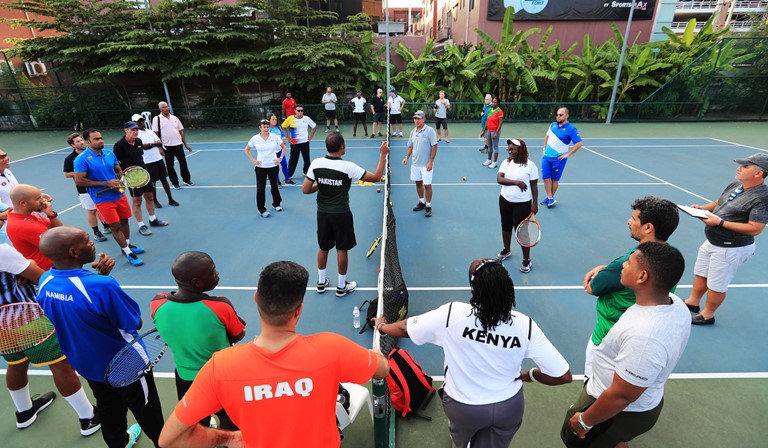Discover the answers to the most frequently asked questions about Officiating - including information about the ITF's officiating schools, and how you can become an official
I'm interested in becoming an official. What do I need to do?
Your officiating career starts at a National Level. The first step would be to contact ITF Officiating to express your interest in getting started. ITF Officiating will then forward your details on to the relevant National Association (NA) Officiating Manager. The NA Officiating Manager will get in touch to advise on training programmes within your country and provide guidance on work opportunities and progression. While you are working at a National Level, the NA Officiating Manager would be your main point of contact.
What is the ITF Officiating Schools programme?
The ITF Officiating Schools programme provides comprehensive training for those who want to become a certified Chair Umpire, Chief Umpire or Referee. Designed to improve the quality of officiating from grass roots to Grand Slams, there are schools for four levels of officiating: National, Level 1 (ITF Green Badge officials), Level 2 (White Badge) and Level 3 (Bronze, Silver, Gold Badge).
I have experience of being a national official - how do I go about becoming an ITF certified official?
You must speak to your NA Manager about registering on the ITF Officiating Portal in order to complete the online application. Your application will then be reviewed by your National Association and if endorsed, it will be sent to ITF Officiating for consideration. It is essential that you are actively officiating to a high standard and if you are applying as a Chair Umpire, ideally you should have a substantial amount of experience in Professional Tennis to increase your chances of selection. Selections are predominantly based on work rate, evaluations and input from other sources, such as National Associations.
Before I attend a Level 2 School, must I first attend a Level 1 School and obtain my Green Badge?
No, if you can pass an exam in English, you can proceed straight to a Level 2 School to gain a White Badge certification. Level 1 Schools are taught and examined in Spanish or French (depending on where the school is held) and Level 2 Schools are taught and examined in English only. Green Badge level is only offered for a Chair Umpire certification.
How do I reach International status as an official?
If you have successfully completed a Level 2 School and obtained a White Badge certification, you are eligible to apply for a Level 3 School. If you pass this final level of schooling, you will achieve International status. Promotions to Silver/Gold Badge are discussed during the end of year re-certification meeting by the panel, comprised of members of the Joint Certification Programme (ITF, ATP, WTA and Grand Slam tournaments).
Where are ITF Schools held?
Level 1 and 2 Schools should be linked to an ITF World Tennis Tour event and the aim is to hold at least one school in each continent every year. Level 3 Schools are held at venues in countries that have major airports and most central for students to travel to.
How much do officials get paid?
There are a number of factors which affect the amount of money an Official might get paid. For ITF Tournaments, we have some minimum recommended fees according to the type of event an Official is working. Since the cost of living varies so much in different countries around the world and exchange rates change regularly, we encourage National Associations to make agreements on a national basis in local currency with the officials regarding the fees paid for officials. Some examples are below:
ITF World Tennis Tour W60, W80 and W100:
Supervisor: US$ 1700 *
International Chair Umpire: US$ 825 *
White Badge Chair Umpire: US$ 550 *
ITF World Tennis Tour M15, W15, M25:
Supervisor: US$ 1100*
International Chair Umpire: US$ 750 *
White Badge Chair Umpire: US$ 550 *
* These fees are regarded by the ITF as minimum levels and is the Gross amount to be paid (before their income tax and any other deductions are subtracted from their pay). In many countries around the world actual fees paid are considerably more and are agreed with the tournament organiser.
How do I know if I'm doing a good job as an official?
At most tournaments an official has the opportunity to be evaluated. A more experienced official is responsible for evaluating your performance and providing constructive feedback to help you improve. These evaluations will help in your continuing education throughout your career. The ITF, ATP and WTA use one common evaluation form at all professional tournaments for Chair Umpires, Referees and Chief Umpires. All evaluations are reviewed and are used in determining an official’s certification and in selecting officials for schools and tournaments.
-

-
 Company Structure Get to know our President, Board and Senior Leadership Team
Company Structure Get to know our President, Board and Senior Leadership Team -
 Science and Medicine Visit the ITF Injury Clinic for information on tennis injuries
Science and Medicine Visit the ITF Injury Clinic for information on tennis injuries